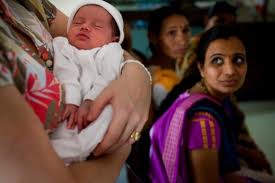Babies, Poverty and Women’s Rights
Oct 7th, 2013 | By admin | Category: Family PlanningBy Suzanne York, www.howmany.org
Poverty drives people to do some drastic things, and bearing a child for money is one of them.
Commercial surrogacy is defined as when a woman is financially compensated beyond expenses associated with the pregnancy for carrying the child of another couple.
India is home to a large number of surrogate mothers, most of whom are poor. Commercial surrogacy was legalized in 2002. There is no official number, but the UN estimated in 2012 that there are over 3,000 fertility clinics in the country.
Some people think the surrogate mothers are being exploited, and others think it offers a chance to get out of poverty. Either way, India is looking to regulate the industry via a law that could make it more dfficult for foreigners to use surrogate Indian women.
The risks of pregnancy are not minor, especially in the developing world. The World Health Organisation (WHO) reported that in 2008 more than 358,000 women died from complications related to pregnancy or childbirth. Furthermore, an alarming 10 million women suffer from injury, infection or disease as a result of a pregnancy.
Reuters recently published a good overview of the situation in an article called India seeks to regulate its booming “rent-a-womb” industry.
According to the article, one clinic in the state of Gujarat charges couples on average $25,000 to $30,000 for surrogate services (substantially less than what it would cost in the U.S., which is approximately $70,000). The surrogate mother gets about $6,500, which is a large amount of money in a nation where 33% of Indians live in poverty.
The BBC is also airing a documentary called “House of Surrogates” on India’s surrogate industry. It takes a close look at probably the most famous clinic in India, addressing the critics who state the business exploits the poor, and a doctor who runs the clinc and believes that she is empowering the local women with life-changing amounts of money.
Reuters cited a study by the Indian government that found that there was “no fixed rule” regarding compensation and no insurance for post-delivery healthcare. Ranjana Kumari, who directs the Centre for Social Research and conducted the study, said that “In most cases, the surrogate mothers are being exploited.”
Is this exploitation of women’s bodies, or a path out of poverty? Women’s rights groups say the fertility clinics are baby factories for the rich, and poor and uneducated women are talked into signing contracts they don’t understand. This is why more regulation is needed. If it makes it tougher for foreigners to “secure” a baby but results in a safe, more positive experience for surrogate mothers, than that should be the end goal. It could help both parties improve their lives, but only if everyone involved understands what is at stake.
Many women may want to become surrogates as a means to escape impoverishment, but there must be complete understanding and full disclosure of what is expected of them. There are too many gray areas for misunderstanding, to put it lightly. The rights of the mother should be placed above anything else. As surrogacy is a booming business in India, there is great risk that rights, health and safety could fall between the cracks.
Greater laws, regulation and monitoring of surrogacy – in India and globally – are steps that will help to protect women’s rights.
Suzanne York is a senior writer with the Institute for Population Studies.
[photo credit: www.panos.org.uk]

